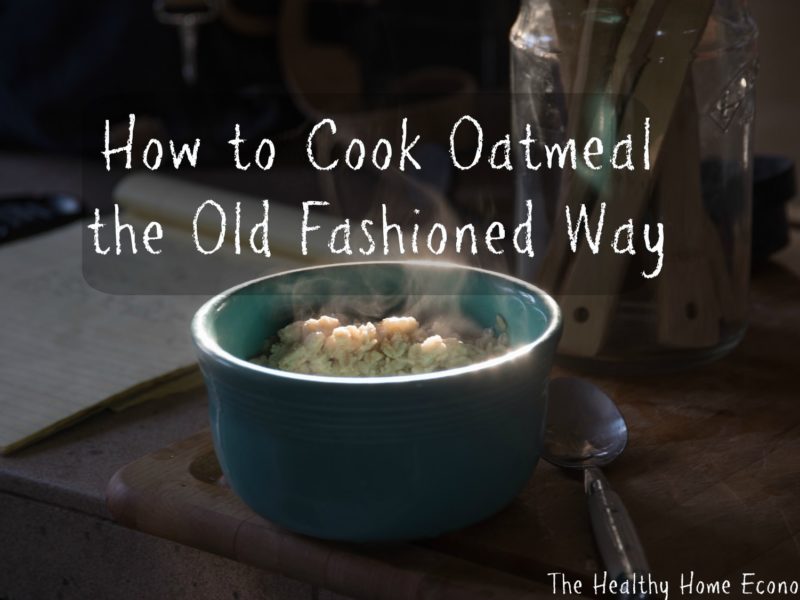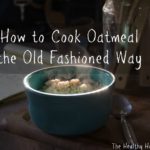How to soak and cook oatmeal the traditional way, aka “overnight oats” for a digestible and nourishing breakfast that will keep you feeling full all the way to lunch!

How do you cook oatmeal the healthiest way possible? Is it acceptable to cook it in the microwave, quickly poured out of convenient, ready to use packets? Do you think this is a healthy start to the day?
Reality Check: Ripping open a package of instant oatmeal, pouring it in a mug with some water and nuking it in the microwave for a couple of minutes is NOT a nourishing breakfast! And guess what … you will feel hungry again about an hour later!
Don’t get me wrong here – oatmeal can and should be a healthy breakfast!
How you choose to cook oatmeal, however, is the critical step that most people completely miss and which determines how much nourishment and benefit you will actually derive from the experience. It is one of the most important cooking skills to learn yourself and teach children before they leave home.
Preparation determines how long the oatmeal will fill you up. What good is a bowl of oatmeal if you are hungry again and ready for a donut fix by 10 am?
Overnight Oats the Traditional Way
Learning to prepare overnight oats as practiced for centuries by ancestral societies will take a little planning on your part. But, you will be greatly rewarded with a much more nourishing, digestible breakfast that will stay with you all the way to lunchtime!
Traditional peoples knew through observation that grains were very hard to digest and caused health problems over time for those who consumed them without careful preparation.
Throwing out those boxed breakfast cereals that are at least twice as expensive per serving and toxic to boot and replacing with a simple, nutritious bowl of porridge will also help your food budget considerably with no loss in pleasure or enjoyment particularly on chilly winter mornings!
TIP: I’ve had people email me to complain that when you cook oatmeal by first soaking for at least 7 hours or overnight, it results in a sour tasting porridge. I’ve found that soaking in water plus lemon juice produces a delightful and slightly lemony porridge that is not sour at all and absolutely pops with flavor! If you still need help adjusting to the taste of soaked oatmeal, the linked article plus video will share an easy way to slowly adapt.

How to Cook Oatmeal (traditional method)
The traditional method for preparing overnight oats and cooking oatmeal the next morning that results in a bowl of porridge that is very digestible, filling and nourishing compared to modern convenience methods.
Ingredients
- 1 cup rolled oats preferably organic
- 2-3 cups filtered water
- 1-2 Tbl lemon juice optional
- 1/2 tsp sea salt
Instructions
-
Mix the oats, 2 cups of water, and lemon juice in a pot. Cover and leave on the counter (NOT in the refrigerator) for at least 7 hours or overnight. If you have trouble digesting grains, feel free to soak for as long as 24 hours.
-
When soaking is complete, add 1/2-1 cup additional filtered water to the pot. Bring to a boil with the salt. Cook oatmeal thoroughly for 5 minutes. You do not need to rinse the oats before cooking.
-
Traditional oatmeal is best served with butter and/or cream for optimal assimilation of minerals. A natural sweetener, nuts, raisins or other fruit may be added as desired.
-
Refrigerate leftovers.
Recipe Video
Recipe Notes
Store bought or homemade apple cider vinegar, yogurt, or kefir may be substituted for the lemon juice.
If you are just starting to soak oatmeal for breakfast, feel free to just soak with water at first and gradually build up to the 4 tablespoons of recommended acidic medium (I prefer lemon juice).
Detailed Video Tutorial
In this longer video below, I show you exactly how I cook rolled oats into oatmeal.
It requires the initial step of soaking the night before. Then, it cooks up quickly the next morning!
Be sure to refrigerate any leftovers for a fast warm-up on the stove on subsequent mornings.
No Rinsing Required
You do not need to rinse the soaked oats before cooking. The antinutrients are deactivated, so no further effort is needed other than simmering for a few minutes on the stove!
I do not recommend soaking oat groats. The linked article explains why.
Soaked Oats vs Sprouted
If you don’t think you can manage the two minutes it takes before you go to bed to put on a pot of oatmeal to soak, this article shows you how to prepare traditional oatmeal without soaking using sprouted rolled oats instead.
This article on sprouting vs soaking explains the differences nutritionally and digestively speaking.
More Soaked Porridges to Enjoy!
If you find overnight oats to be enjoyable and more digestible, try amaranth breakfast cereal, teff porridge and buckwheat hot cereal too.








I have some tooth issues, so I have been avoiding grains, nuts (except for scant amounts of sprouted and fermented almond butter), and seeds for a while now because of phytic acid. But I really miss having homemade sourdough bread and porridge. I have my own grain mill, so when eating porridge, I usually crack my grains fresh and ferment them for 48 hours with a sourdough starter, and I eat them with an egg and plenty of ghee or butter for nutrient density. But lately I have read that reducing/eliminating phytates ‘ought to be’ a way more laborious process than simply grinding grains and fermenting them with sourdough or an acid medium. Apparently one needs to soak the grains at such-and-such a meticulously maintained temperature, sprout them, sun dry them, grind them, sift out the bran/germ, and ferment them. But I don’t really have the time (or equipment) to dedicate all of that effort toward porridge. Is all of that necessary? Could I just grind, sift, and ferment my grains for porridge and still safely reduce the phytic acid content? Also, is using sourdough an acceptable medium, or is lemon juice/vinegar/whey ‘stronger?’
All you need to do is soak the oats overnight and then cook them as described in the recipe in video.
Hi Sarah. When soaking, doesn’t the water contain all the bad stuff like phytin? We soak to get rid of phytin, amongst other things. But then we still keep the water that contains all that stuff. I assume that there is no other way for oatmeals…?
The anti-nutrients in the oatmeal are deactivated by the soaking and cooking. No, you aren’t eating them in a form that will harm you.
I don’t understand the chemistry behind adding rye or buckwheat flour to the oats. Can you please explain. I am learning about removing lectins from my diet and I already have begun to soak my grains.
Adding a bit of buckwheat flour adds the enzyme phytase to the oats which breaks down the phytic acid. Oats contain little phytase on their own. Hope that helps!
I’ve been soaking overnight in mason jars rolled oats in almond milk adding wheat germ, chia seeds, blueberries and honey. In the morning I have a grab and go breakfast. It tastes great but is it bad that it is not cooked?
You MUST MUST MUST cook the soaked oats before eating them! Soaking oats is not enough to prepare them for the very simple, one stomach human digestive tract. The oats are still very much raw after soaking and eating raw grains is a very dangerous practice.
Question regarding adding butter or cream for “…best assimilation of minerals”: is any fat good or does it have to be dairy? For example can i use coconut oil and obtain the same benefit?
Coconut oil would be fine as well!
Why not steel cut?
You are doing a disservice to your readers, claiming that you can’t eat “raw” rolled oats. Rolled oats are produced by steaming whole oat groats, rolling them flat, then drying them in a kiln. As they are a cooked product, no amount of soaking is going to change the phytic acid content without adding wheat, rye, etecetera. Furthermore, instant oatmeal is simply rolled oats that have been chopped up finely to speed up cooking time.
Hi Sarah, thank you for sharing this recipe and traditional method of preparing oats. We have been following this recipe for a few months now and really enjoying our oats! We try soak for a minimum of 7 hours up to 12 hours. We use ACV as our acid. We do rinse them before cooking as we prefer not to have the sour taste. My question is does this method sufficiently remove phytic acid? I’m a little confused as this artice on WAP website says its not sufficient and that one needs to add rye flour and have it heated – westonaprice.org/health-topics/vegetarianism-and-plant-foods/living-with-phytic-acid/. I’m not sure I can tolerate rye flour due to gut issues. So I’d like to stick with your recipe if possible, I just don’t want to be consuming a lot of phytic acid for health and dental reasons. I would love to hear your feedback! Thanks so much 🙂
Adding a bit of rye or buckwheat flour will reduce phytic acid levels even further in soaking oatmeal, but you don’t have to do this. I don’t.
Would you please share your sources for the information about the digestability of oats, and also about the processing of prepared oatmeal packets. I would love to have some scientific support for these claims to convince my husband. I am particularly interested in these two statements you make:
1. In the video you say, “Boxed breakfast cereal is highly allergenic and indigestible due to the processing…it denatures the proteins.” (I have read your separate article on this topic, but no sources are cited there.)
2. In the comments for this article you say, “Raw oats should never be eaten .. the human digestive system is completely unequipped to handle such a harsh food in a raw state. You must cook oats else you are risking your long term digestive health.” (How does it damage your digestive health, and where can I read the research that supports this?)
Thank you!!
This article is written based on the practices of traditional cultures which never ate raw oats or oatmeal cooked without careful soaking/souring first. These cultures understood that eating oats prepared improperly would make them sick by causing digestive problems over time. They didn’t have the purple pill or other drugs to cover up digestive symptoms like people have today so having healthy digestion was extremely important for survival. Modern ways of eating oatmeal ignore this valuable historical and anthropological evidence. The book Nutritional and Physical Degeneration has a wealth of info and pictures on this subject.
I can’t abide COOKED oats. I love oats but I like them raw, not cooked and slimy. Is there anything wrong with eating raw oats prepared with an acidic medium and left overnight?
Raw oats should never be eaten .. the human digestive system is completely unequipped to handle such a harsh food in a raw state. You must cook oats else you are risking your long term digestive health.
Hello Sarah,
Thank you for the article and your comments. Just so I get this right – even if I soak oats in warm lemony water overnight I can just add yogurt in the morning and eat them? Do I really have to cook them (pass the boiling point?)
Thank you for you reply e
Once soaked over night … they are *cooked* as usual. Yes, you need to cook them as this completes the process of making oats digestible.